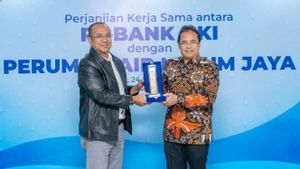JAKARTA - The latest report from the International Institute for Sustainable Development (IISD) shows that energy support measures in Indonesia reached IDR 279 trillion in the 2020 fiscal year.
Of the IDR 279 trillion, 88 percent or IDR 246 trillion is allocated for fossil fuels.
The report also reveals that the government provides at least Rp74 trillion for the oil and gas industry, Rp112 trillion for fossil-based electricity, and Rp61 trillion for the coal sector.
Anissa Suharsono, the author of the report from IISD, said that Indonesia's incentives for fossil fuels were 117 times higher than support for renewable energy, which only received IDR 2 trillion or less than 1 percent of the total support for the energy sector.
While Rp31 trillion for biofuels and Rp19 billion for electric vehicles.
"This report warns that in the context of today's high energy prices, these support figures are expected to increase significantly by 2022. Last May, the Indonesian Parliament approved the government's request for an additional IDR 350 trillion in energy subsidies, adding to the IDR 154 trillion already spent on the first quarter of this year," he explained in a statement received by VOI, Tuesday, June 28
Furthermore, he added, the study conducted by IISD includes support that is officially classified as a “subsidy” and incentives that support various types of energy in Indonesia.
This study highlights Indonesia's outstanding support for the fossil fuel sector in the 2016-2020 period, with 94 percent on average per year allocated to oil and gas, as well as coal-based electricity, and only 1 percent to renewable energy.
The proposed inventory also looks at fiscal measures and instruments that are not directly considered “subsidies” in the Indonesian government budget.
"While most of these instruments cannot be measured (mostly in the form of tax deductions, tax holidays, or exemptions for the fossil fuel sector)," he said.
Another instrument is in the form of significant state investment for oil and coal producers, as well as for PLN, which was revealed in the study.
The main ones are special royalty rates and special corporate taxes for small coal mining companies (estimated at more than Rp. 33 trillion in 2020), special export tax rates for coal (estimated at Rp. 16.5 trillion in 2020), or import duty exemptions for contractors for coal mining companies. oil and gas yields (estimated at IDR 765 billion).
Experts warn that Indonesia's disproportionate support for fossil fuels is slowing the energy transition, draining public budgets, accelerating climate change and endangering public health.
"Indonesia critically needs to shift support from fossil fuels to renewable energy to meet climate targets and energy mix targets, and reduce dependence on fossil fuels whose prices are unstable," he continued.
Anissa stated that these incentives represent a huge cost to the public budget—especially in the context of today's high energy prices—and are very detrimental to public health and the climate.
The IISD report also highlights that current policies undermine the country's energy targets and environmental obligations.
The report's authors make concrete recommendations for the government to realign its incentives, by reforming policies that benefit the fossil sector and shifting to renewable energy investments instead.
Amid soaring energy prices and a cost of living crisis, targeting support to the poor and vulnerable is key to conserving scarce public resources.
IISD experts recommend this budget should be used efficiently and serve to pave the way for a just transition away from fossil fuels.
To do this, the government can improve the two main forms of assistance, namely, subsidies to PT Pertamina (Persero) to sell fuel at below market prices and subsidies to PT PLN (Persero) to provide cheap electricity.
This is because these two aids are mostly enjoyed by the wealthier segments of the population, which consume more electricity and fuel.
“Reforming policies in favor of fossil fuels and ensuring that low-income groups receive targeted support to deal with rising prices, makes existing resources available to invest in renewable energy, clean transportation and sustainable infrastructure,” said study co-author Lourdes Sanchez of IISD. .
According to Sanchez, this move will ensure the poor are protected while enabling Indonesia to switch to renewable energy sources that are more resilient to global price shocks and provide affordable clean energy for everyone.
The English, Chinese, Japanese, Arabic, and French versions are automatically generated by the AI. So there may still be inaccuracies in translating, please always see Indonesian as our main language. (system supported by DigitalSiber.id)









